|
Bird
Hazard
|
|
 |
Teflon
Teflon
is THE most dangerous thing a bird can encounter! If
Teflon is heated to 500 degrees or begins to burn, the resultant fumes
can instantly kill a cockatiel. I've heard of one woman losing all
of the birds in her house (6 of them) at the same time because a Teflon
pan was left burning on the stove. Therefore, use only untreated
stainless steel, glass, or ceramic cookware in your home. And
always turn on the stove vent or fan when cooking to eliminate cooking
fumes. Like carbon monoxide, Teflon fumes are odorless and
invisible. It travels through the air unnoticed. In humans, it causes
flu-like symptoms and in birds, it kills. There are household
items that you may not think contain Teflon but do...
Certain plastic oven cooking bags (Reynold's
and Durkee Cooking bags) may contain Teflon, as well as room space
heaters, woks, hot air popcorn poppers, bread makers, laundry irons,
pizza pans, waffle and pancake grills, and hair curling irons may also
have a Teflon coating. If not sure, contact the manufacturer.
More on Teflon here...
and here. |




 |
Toxic Foods and Chemicals
Caffeine, chocolate,
alcohol and avocado
should NEVER be fed to a bird.
Chocolate, coffee,
and cocoa contain theobromine, which is very toxic to birds. Do not give
these to your birds and do not leave them out where your bird could get
to them. Avocado is highly toxic. Guacamole
can kill your cockatiel. Onions
should also be avoided.
Salt: Even though Birdie, our cockatiel just loves a salty
potato chip or corn chip, parrots cannot excrete salt the way we can.
High-salt foods can be harmful to them. An occasional nibble from a chip
might be okay, but don't let them get into the habit. Junk
food is not good for your bird. Avoid high-fat, high-sugar,
high-salt snacks. Once in a blue moon won't kill them, but beware of
always giving foods like this, and always provide water if your bird
does occasionally eat these items. Parrots can get into bad habits just
like humans. Resist the temptation to give in to them even if they
"beg" for your chips.
Alcohol: Although it seems obvious, I will state it
nonetheless. Do not give alcoholic beverages to your bird under any
circumstances. It is cruel, not amusing, to get your bird drunk.
Their liver cannot metabolize the alcohol.
Nickel or lead plated jewelry
is also toxic and lead can be fatal, so keep the bird out of your
jewelry case.
Household cleaners, paints and glues:
Please remember to
read the directions on any spray you use in your home and exercise
common sense. Do not spray things directly on pets or their bedding or
cages. Air out rooms before returning birds to them no matter WHAT you
use to clean. A more comprehensive list on toxic cleaners
and scents can be found at: http://www.parrotparrot.com/birdhealth/alerts.htm#scents
There are also certain poisonous plants to keep away from your birds.
Just remember, anything that emits fumes or scent can potentially be
dangerous to your bird.
Toxic plants can be found at www.cockatiel.com.
Also do not give seed pits: almond, apple, apricot, cherry, peach, pear
and plum, to your bird.
|
 |
Scented Candles, Potpourri
and Essential Oils
Smoke of any kind is hazardous to
a cockatiel's little tiny respiratory system. Some of the fumes emitted
by scented
candles can kill them as well. The hot wax from the candle is
also dangerous and will burn the bird if she comes too close to
investigate. Potpourri can also look very enticing to a bird, but the
perfumes and oils used to give it scent are definitely poisonous if
ingested. Plug in air fresheners are also a "no-no".
If you are into the "holistic health" trend, please do not
burn essential oils near your bird. Birds can succumb upon a
single exposure if they are kept in a confined space where they cannot
escape the fumes. Tea tree oil fumes are particularly
hazardous to birds. Also, do not add tea tree oil or other similar
products to the water of humidifiers. |
 |
Cigarette Smoke, Nicotine
& Tobacco
Never, never, never smoke in the house if you have a bird. Second
hand tobacco smoke is bad for everyone, including pets. Avian
veterinarians say that tobacco smoke can cause chronic eye problems,
skin irritation and respiratory disease, such as coughing, sneezing and
sinusitis. When a bird stands on a hand of a smoker, nicotine from the
smokerís fingers can be absorbed by the skin of the birdís feet,
which can lead to contact dermatitis. So if you do choose to smoke outside,
be sure to wash your hands thoroughly with soap before handling your
bird. Some veterinarians believe that tobacco smoke may be a
contributing factor in feather plucking. Please do not smoke
around your birds, or let others smoke around your birds. Again, if you
do smoke, wash your hands thoroughly before handling your birds. |
 |
Aerosol Sprays
Never spray ANYTHING in a bird's
room. If you need to use a cleaner or aerosol in his room, either move
him out of the room or spray the can onto a paper towel in another part
of the house. Do not spray hairspray or room freshener anywhere
around a bird. Leather
protectant sprays: A man took the leather coat into another room to
avoid exposing his birds to the spray. He left the house for a few hours
after this. He came home and all his birds were dead.
Be also aware of glue guns which can emit toxic fumes. Any
item that releases strong fumes to scent or "clean" a room
should not be used while a bird is in the airspace. Put the bird in
another room until you are sure the fumes have dissipated. Open the
window to the room before returning your bird to his or her cage so it
can be well ventilated and free of residual chemicals. Common sense is
the best approach: if in doubt about an item, put your birds someplace
safe where they won't be exposed to the fumes. |
 |
Ceiling Fans and other
fans
Cockatiels are inquisitive by
nature and will explore almost anything. If you use fans, be sure
that they are located where your bird cannot get at them, and that they
have a screen around them to prevent any accidents. Never
turn on a ceiling fan if the bird is in the room. This is one good
way to decapitate a bird. Even a clipped bird will sometimes amaze
you with its flying ability and can accidentally get hit by a rotating
ceiling fan. If the bird is not in the room when the ceiling fan
is on, make sure the bird cannot come into the room, and turn the fan
off before you leave the room otherwise you may end up with
"shredded tweet".
|
 |
Stoves, Toaster Ovens
Keep the bird off of stove tops
(even if they're off), one day the stove or toaster oven may be on while
you're not around and the bird may accidentally land on it and burn
himself severely. |
 |
Toilets, Jacuzzis, and
Indoor Pools
Indoor pools, toilet bowls, and
jacuzzis filled with water pose a hazard to clipped birds. They
can easily drown if unsupervised. Close the cover on the toilet bowl if
the bird is in the bathroom. |
 |
Toys
Buy bird safe toys that won't choke, entangle or harm your bird in any
way. Keep away from toys that have sharp or pointy edges or nails,
or things that have many small parts on which a bird can choke on.
Always examine a toy before buying it and placing it in your bird's
cage. Check out Hornbeck's
Bird Supply page for lots of good safe bird toys. |
 |
Floors
Watch where you walk. Some birds, especially cockatiels since they
are ground feeders, love to walk on the floor and pick up junk, carpet
yarn, lick dust, or just march around on the floor. You don't want
to step on your little darling, so watch where you walk. Recliners
or sofas chairs that revolve or recline can also pose a danger to a
bird. The bird may be walking under the foot-rest part of your
chair and if you should pull it back upright suddenly without looking,
you may squash your bird in between the foot-rest of the chair. |
 |
Open Windows, Doors,
Skylights
Windows and doors to the outside
world should be closed whenever the bird is outside the cage -
cockatiels can and do escape, frequently, never to be seen again.
Clipping your bird's wings is one of the best things that you can do to
prevent him from injury. Cockatiels are very strong fliers, and many of
them have been hurt or killed by flying into a window, skylight, mirror
or wall. When closing interior doors always check on top of the
door before closing it to make sure your buddy is not sitting up there.
Sliding glass doors have also been known to squash birds that have
"slipped by" unnoticed. Birds have also hopped off
owners' shoulders and into open refrigerators and freezers. |
 |
Other Animals
Regardless of how friendly or well trained your other pets may seem, it
is unwise to leave them alone with a cockatiel. Many pets are natural
predators of birds, and no amount of training can overcome natural
instinct 100% of the time. Cat bites should be considered the most
dangerous, as the bacteria commonly found in the feline mouth, are
extremely hazardous to birds. Even a simple puncture by a tooth can
result in a fatal infection. Scratches from claws are also extremely
dangerous, as the risk of infection is very real. Additionally,
other animals are larger or stronger, and may injure or kill the bird
even if they were only playing. Always supervise interaction between
your animals. |
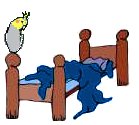 |
Bedcovers and Laundry
Our cockatiel Tiger has a strange habit of going under our bedcovers
(sometimes while we're napping) and exploring under there. One day
he came out breathless with a little blood on his nose. He could
have easily suffocated. We no longer allow him to do this.
Your bird should not be allowed to play on the bed unsupervised and make
sure you don't fall asleep while he's on the bed with you. There
is always the chance that the bird can get lodged between the bed-frame,
mattress or you, smothered under a pillow, or be rolled over on during
sound sleep. Although it is fun to read or watch television in bed
or on the sofa with a pet bird, if there is a chance that you might doze
off, it is time to return the bird to its cage.
Your laundry can also pose a danger. One bird who was playing in a pile
of clothing in the laundry basket was drowned when its owner dumped the
clothes into the washing machine, closed the lid, and "washed"
the bird with the dirty clothes. Another bird climbed into the
open dryer and the unsuspecting owner closed the door and turned on the
dryer. |
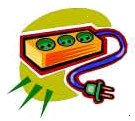 |
Electrical
Cords
Cockatiels love to chew on just about anything they can reach. In
addition to the danger of being electrocuted by chewing through a power
cord, these cords contain metal that the bird could ingest. If the
bird swallows these little metal shavings, it could easily be fatal.
Always watch what your bird is doing - you have to be vigilant when the
bird is out of the cage. |
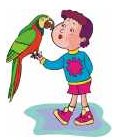 |
Children
Small children can scare the hell out of a bird if left unsupervised
together. Make sure that the child does not grab, hit, tease or
hurt your pet bird, or allow it to fly outside. Children can
frequently make sudden and frightening movements that the bird may not
expect. The bird will be traumatized for life he or she has a bad
experience with a child. Our bird Tiger, whom we adopted from a former
home with children, still does not trust the "small people"
when they come over to visit. Birds are not good
pets for young children. If you intend on getting a bird for a young
child please reconsider. A young child may not be capable of handling a
bird safely. Children who are too young are unable to understand the
importance of gentle, respectful handling and that can end up with a
tragedy pretty quickly. There should always be an adult around for
supervision and guidance as well as to make sure that the birdís needs
are met with fresh food, water and a clean cage, etc. |
 |
Fly
Paper
Those sticky fly paper strips should not be anywhere near your bird.
If a bird flies into them, he will also get stuck, just like a fly. They
can injure themselves trying to get "unstuck," the chemical on
the strip is poisonous, and you will have a heck of a time trying to get
all of the sticky stuff off their feathers. |
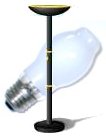 |
Lamps and Halogen Light
Bulbs
Have you ever tried touching a
halogen light bulb after it's been on for a while? Hot, yes, very
hot! Lamps that expose the bulb present a great hazard to birds.
Your bird can land on the hot halogen light bulb and burn his foot.
Some of these lamps are also a fire hazard because they do not have the
protective grid to prevent contact with curtains and other materials
should they fall over. Do not allow your bird to land on any
lamps. Even a normal incandescent light bulb can generate
sufficient heat to burn the delicate footsies of a curious bird. |
 |
Cold and Drafts
Keep your house at a pleasant temperature (for your sake and your
cockatiel's). When it's cold or freezing outside turn the heat on.
Keep the bird away from drafty doors and windows, since they easily can
become sick if a draft blows on them. Air conditioning and
directional fans too, in this sense, should be placed away from the
bird's cage, so it's not blowing directly on the bird. A draft is
different from just cold air. You could think of it as a
"thread" of cool air. It cuts a path through warmer air.
This is what is hard on birds. Their body has adjusted to the room's
temperature, but they end up in the path of one of these colder threads
air. If your bird is near a window, make sure it's well insulated.
To check it, hold your hand around the edges of the glass to feel for
any "threads" of cooler air. Do this a number of times,
particularly when it is windy outside, to make sure you haven't missed a
drafty spot. |
 |
Heat Stroke
Even though many of our feather friends are from very warm climates,
over exposure to heat can kill them. If they are left in the sun with no
place to escape the heat, they could easily become dehydrated and die.
If you want to take your bird out for some fresh air, do not leave him
out for long periods of time. As the sun goes across the sky, your bird
may become trapped in direct sunlight. Also, you should never leave your
bird alone in the car in warm weather. |
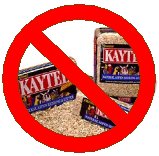 |
Cage Bedding Material
Birds are intelligent and curious animals and many can find a way, no
matter how hard we try to prevent it, to get at the bedding material in
their cages. Unfortunately there are a number of products on the market
today which, if ingested, are harmful to birds and can even cause death.
USE: The
best and cheapest cage liner material you can use is an old newspaper.
Change it at least once a week. Printed newspaper, paper towels,
any plain paper and even brown paper bags can be used. Paper
towels are expensive and very absorbent and are a better choice for
chicks. If using printed newspaper, don't use the glossy pages or
the pages with colored ink as these inks may contain lead and other
harmful chemicals. Hence, don't use magazine paper. Paper
and paper products are very easy to change and allow you to visibly
monitor droppings.
DO NOT USE: Old
walnut shells or dried corn cobs as they can be ingested (nut shells
have sharp edges and can be painfully ingested into the bird's crop and
dried corn expands in the gut causing pain). Do not use cedar or
pine shavings as they are very toxic. Specifically, do not use "Kaytee
Pine and Cedar shavings" and/or "Kaytee Natural Aspen and
Walnut bedding". Don't use sandpaper either on perches or in
the bedding. Do not use "kitty litter", leave that to
the cats. Sandpaper is very rough and hard on the bird's delicate
little feet. Despite what you may hear elsewhere, it will not
"trim" your birds toenails. Get an avian vet to do this
for you if you have no clue how to do it properly. |
|
There are of course other things that may
hurt your pet...Here is another
website which list a few more hazards
and just in time for the Holidays! http://birds.about.com/library/weekly/aa120499.htm
Have a bird safe Holiday!
|
 |
...and so the moral of the
story is... Avoid these dangerous bird hazards and pay attention to your
bird, love it and take good care of your pet bird by spending quality
time with him or her, teaching, talking or singing, and playing with
your little darling bird. They will love you in return. |























